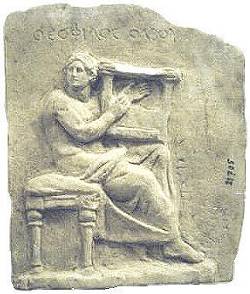|
Home
The role of Alexandria in the Mediterranean
International Trade
Scholars and Scholarly Thought
Religion and Religious Thought
Bibliography
Back to Alexandria Home Page
|
As a seat of learning, Alexandria was no less positively Mediterranean-orientated. Out of the librarians of the famous library of ancient Alexandria - and they were eminent scholars and no mere civil servants - a number came from the various shores of the Mediterranean.
 From a papyrus found at Behnasa in Upper Egypt (P.Oxy. X,1214, col.II), containing the names of six of these librarians, only two are Greeks from Egypt. The other four were : Zenodotus of Ephesus, who was the first scholar to establish a critical text of the two Homeric epics, Eratosthenes of Cyrene, the geographer who tried with a great deal of success to measure the circumference of the earth depending on astronomical data and geographical observation - the final result differing by a matter of only 400 kilometres from its length according to our present state of knowledge. The third of theses scholarly librarians was Aristophanes of Byzanteum who edited excellent texts of the classical poets and other authors up to the time of Plato. And the fourth was Aristarchus, another editor, whose special field was poets from Homer to Pindar.
From a papyrus found at Behnasa in Upper Egypt (P.Oxy. X,1214, col.II), containing the names of six of these librarians, only two are Greeks from Egypt. The other four were : Zenodotus of Ephesus, who was the first scholar to establish a critical text of the two Homeric epics, Eratosthenes of Cyrene, the geographer who tried with a great deal of success to measure the circumference of the earth depending on astronomical data and geographical observation - the final result differing by a matter of only 400 kilometres from its length according to our present state of knowledge. The third of theses scholarly librarians was Aristophanes of Byzanteum who edited excellent texts of the classical poets and other authors up to the time of Plato. And the fourth was Aristarchus, another editor, whose special field was poets from Homer to Pindar.
 Nor did all the scholars of the Mouseon, the ancient university of Alexandria come from that city or elsewhere in Egypt. A great many of them were invited from wherever they could be found in the Mediterranean region, to teach or conduct their research work. Among these we can mane such scholars as Hipparchus the astronomer who came from Nicia and Archimedes of Syracuse, the mathematician famed among other things, for his theory on floating bodies. Another of these Mouseon lights was Herophilus of Chalcedon, the anatomist and surgeon whose school - or 'house' as it was called - acknowledged the dissection of bodies as a basis for conducting their medical research. Philinus of Cos, a pupil of Herophilus was yet another of those scholars. He started a rival 'empirical' school to his master's, relying on therapy, collected experience and reaching conclusions through analogy as well as paying attention to factors which evidently influenced illness.
Nor did all the scholars of the Mouseon, the ancient university of Alexandria come from that city or elsewhere in Egypt. A great many of them were invited from wherever they could be found in the Mediterranean region, to teach or conduct their research work. Among these we can mane such scholars as Hipparchus the astronomer who came from Nicia and Archimedes of Syracuse, the mathematician famed among other things, for his theory on floating bodies. Another of these Mouseon lights was Herophilus of Chalcedon, the anatomist and surgeon whose school - or 'house' as it was called - acknowledged the dissection of bodies as a basis for conducting their medical research. Philinus of Cos, a pupil of Herophilus was yet another of those scholars. He started a rival 'empirical' school to his master's, relying on therapy, collected experience and reaching conclusions through analogy as well as paying attention to factors which evidently influenced illness.
One last instance of the Mediterranean orientation of the Alexandrian Mouseon, is the case of Plotinus, the real founder of Neo-Platonism. Born in Lycopolis (modern Assiout) in 205 A.D., he moved to Alexandria at the age of 28 where he studied philosophy under Ammonius Saccas for eleven years before he finally settled at Rome. There he became the centre of an influential circle of intellectuals which included men of the world and men of letters, besides professional philosophers such as Amelius and Porphyry, the Syrian-born philosopher who became Plotinus' devoted disciple. There he conducted his seminars and gave the last shape to the ideas which he first developed in Alexandria - and which were collected and published post mortem by Porphyry.
Photos: (top) Funerary stele depicting a temple (Graeco-Roman Museum, Alexandria); (bottom) Marble stele depicting a blind man playing the lyre (Graeco-Roman Museum, Alexandria).
|
![]()